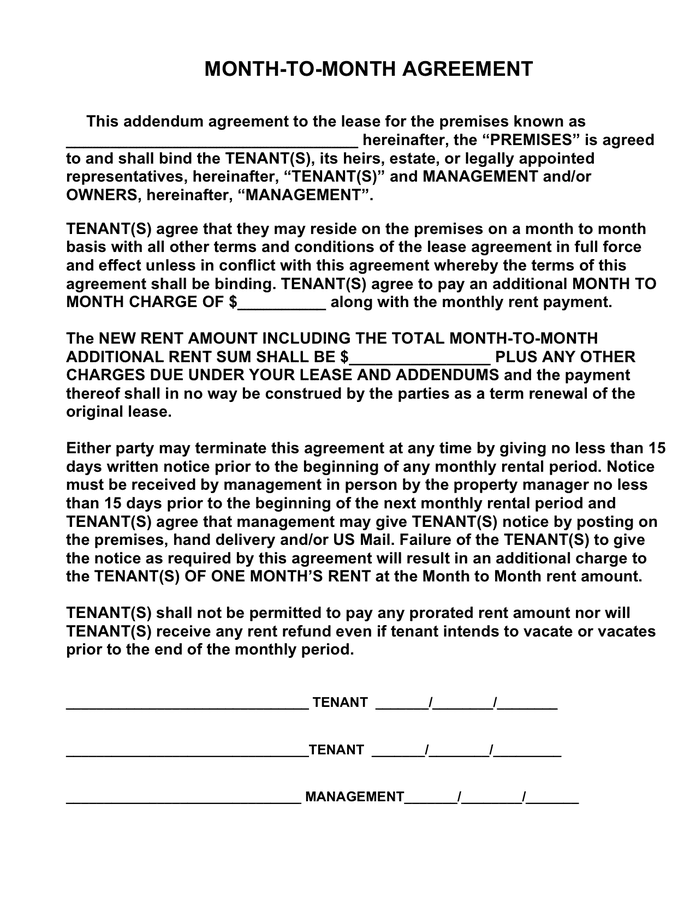How to Handle Evictions Under Month-to-Month Tenant Rights
How to Handle Evictions Under Month-to-Month Tenant Rights
Blog Article
Navigating the difficulties of evictions under month-to-month lease tenant rights may be challenging—whether you're a landlord or even a tenant. Unlike fixed-term leases, month-to-month agreements give mobility for both events, but additionally they come with distinctive difficulties, particularly when eviction is on the horizon. Here, we break up the main element facets of managing evictions under these agreements, providing quality and actionable assistance for all events involved.
Understanding Month-to-Month Tenant Rights
Month-to-month tenancy, while the name suggests, works on a monthly schedule and an average of renews immediately until one party gives notice to terminate. Tenants and landlords alike are at the mercy of the phrases put down within their hire agreement along side relevant state and local laws.
Tenants who book month-to-month have specific rights relying on their jurisdiction. These could contain lease firing detect periods, rights against retaliatory evictions, and access to certain tenant rights when disputes arise. On the change part, landlords retain the capacity to eliminate tenancy with proper detect and cause, if applicable.
To deal with evictions appropriately, it's essential to familiarize your self with the local regulations governing tenant rights and landlord obligations in your area. This knowledge forms the building blocks of moving the process officially and ethically.
Legal Notice Requirements for Evictions
One of the most important areas of evictions under month-to-month agreements is issuing or getting a suitable observe to vacate. State and local rules requirement how much observe a landlord must give before terminating a month-to-month tenancy.
For example:
Common Notice Periods: Many claims need landlords to provide 30 days' discover to stop a month-to-month hire agreement. Nevertheless, that period might extend to 60 days in some jurisdictions.
Notice for Nonpayment: If rent hasn't been compensated, landlords an average of have to problem a "spend or quit" observe, giving tenants a collection amount of time to cover fantastic fees or vacate the property.
No-Cause Terminations: Certain regional regulations may possibly let landlords to cancel month-to-month tenancies without trigger but involve lengthier discover periods.
Failing to adhere to proper legitimate detect guidelines can invalidate an eviction test and may possibly end in penalties for the landlord. Tenants should also realize their rights under these recognize demands to make sure their agreements are terminated lawfully.
Steps for Landlords to Conduct Legal Evictions
For landlords, evicting a tenant under a month-to-month lease needs strict conformity with both rental agreements and the law. Here's a step-by-step information:
Offer Proper Recognize
Problem an official notice to vacate consistent with regional regulations. Guarantee including the reason for firing, if required, and meets the mandatory observe period.
Report Everything
Hold complete records of rental obligations, lease violations, and any communication with the tenant. That documentation will be essential if the eviction proceeds to court.
File an Eviction Lawsuit (If Necessary)
If the tenant won't vacate after appropriate observe, landlords may need to file an unlawful detainer or eviction case. That escalates the problem to court, where a determine is likely to make a determination.
Follow Judge Orders
If the court concept in favor of the landlord, a formal notice or writ of possession will be provided to police force to transport out the eviction. Landlords must prevent trying to artificially remove the tenant themselves, as that violates the law.
Tenants'Recourse for Unlawful Evictions
Tenants facing eviction under month-to-month agreements have rights that protect them from unlawful displacement. If a recognize appears irregular or retaliatory, tenants may:
Enhance the Problem of Improper Detect
If the notice doesn't match appropriate standards (e.g., insufficient schedule or cloudy reasoning), tenants can increase that defense equally immediately with the landlord and in court.
Cite Retaliation Defenses
Specific jurisdictions forbid evictions manufactured in response to tenants exercising legal rights (e.g., processing an issue about harmful conditions).
Use Tenant Advocacy Organizations
Regional organizations and appropriate support groups provides advice to tenants on navigating disputes and seeking representation in judge proceedings.

Avoiding Eviction Disputes
Fundamentally, landlords and tenants alike benefit from start and transparent transmission all through month-to-month agreements. Addressing problems early, such as for instance late payments or misconceptions about phrases, can often reduce an eviction from becoming necessary.
For landlords, ensuring submission with state laws and maintaining skilled, respectful connection sets a basis for effective tenant relationships. Tenants, on the other hand, should honor the terms of these agreements while outstanding knowledgeable about their appropriate protections.
Final Thoughts
Evictions below month-to-month tenant rights involve managing legal obligations and ethical considerations. Both landlords and tenants must realize their tasks, rights, and responsibilities to ensure the method is handled pretty and lawfully. When in doubt, consult a appropriate professional devoted to housing legislation to steer you through the process. Report this page